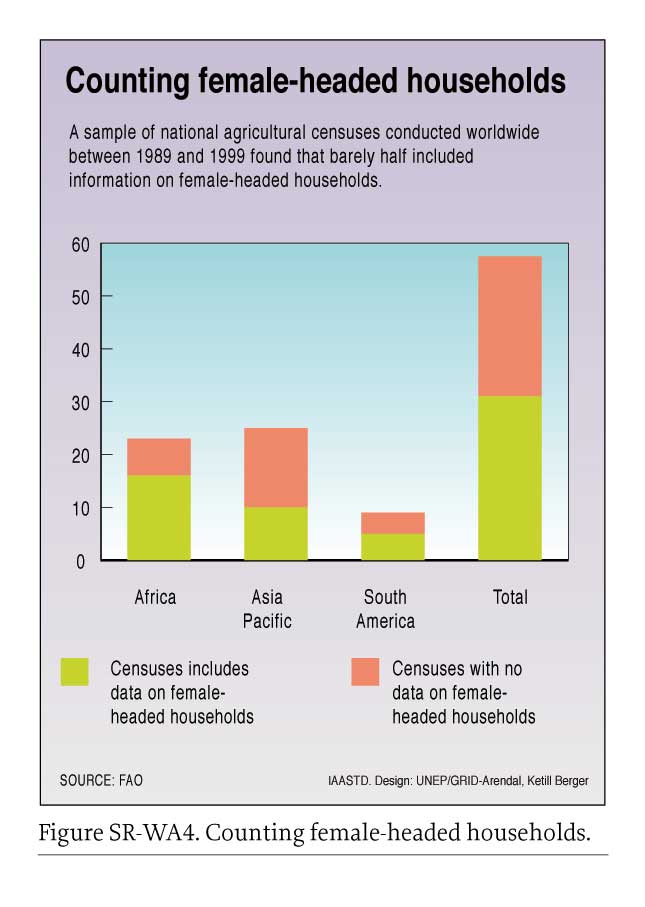come, thus reducing women's dependency on the male provider [ESAP Chapter 5].
Although the supply of gender disaggregated data and studies of women's roles in agricultural production and food security is increasing, there is still a lack of sufficient data and in depth research on women's practices and specific needs. Indirect impacts of AKST in relation to ownership of assets, employment on and off farm, vulnerability, gender roles, labor requirements, food prices, nutrition and capacity for collective action have been less thoroughly researched than the financial and economic impacts, although, recent impact assessments of participatory methods have more comprehensively addressed these issues [Global Chapter 3].
Also agricultural research policies have tended to primarily focus on the intensive farming sector and export-oriented crops, and have given insufficient attention to food crops for domestic consumption, which are essential for household food security and environmental protection [Global Chapter 2]. Small-scale farmers, particularly women, play a key role in promoting sustainable methods of farming based on traditional knowledge and practices. Women often possess knowledge of the value and use of local plant and animal resources for nutrition, health and income in their roles as family caretakers, plant gatherers, home gardeners, herbalists, seed custodians and informal plant breeders [Global Chapter 2]. Moreover, women often experiment with and adapt indigenous species and thus become experts in plant genetic resources [SSA Chapter 2].
Climate change. Effects of flooding, drought, variations in crop seasons and temperature-related yield loss could mean extra hardship for the farming and food provisioning activities, which are often carried out by women. Their capacity to sustain their families' livelihoods is in fact often reduced as a result of the loss of seeds, livestock, tools and productive gardens [ESAP Chapter 4]. The increase of extreme weather conditions (e.g., floods and cyclones), notably in ESAP regions, will put an increasing expectation on women for coping with the effects of disaster and destruction.
Women are underrepresented in decision making about climate change, green house gas emissions and adaptation/ mitigation in both the public and private sector. Lower levels of access to training, education and technologies will affect the ability of women to cope with climate change induced stresses.
Women of reproductive age as well as children are most affected by the increase of infectious diseases (e.g., malaria). The worsening health situation is exacerbated by a high rate of malnutrition in children especially in regions, like SSA, with repeated droughts, wars and conflicts. Intra-household food distribution often favors males, which can give rise to micronutrient deficiencies in women and children which impair cognitive development of young children, retard physical growth, increase child mortality and maternal death during childbirth [Global Chapter 3]. Nutritional deficiency among women and children in South Asia also has reached crisis proportions [ESAP Chapter 1]. The impact of HIV/ AIDS in an increasing number of countries has given rise to rapidly increasing numbers of female-headed households, child-headed households, and dependence on the elderly who face increasing workloads as they assume responsibil-
ity for growing numbers of AIDS orphans [SSA Chapter 3]. In SSA women make up two-thirds of those infected with HIV/AIDS. This adds additional burdens for women as producers of food and as family caretakers. Labor loss due to illness, need to care for family members and paid employment required to cover medical costs may cause families to decrease their farming activities The stress of HIV/AIDS on the social capital within communities also erodes the transmission of knowledge between households and communities, thereby reducing the range of livelihood options for the next generation [Global Chapters 6, 7].
Options for Action to Enhance Women's Involvement in AKST
In view of the continuing constraints faced by rural women and the current forms of agricultural restructuring likely to worsen farm women's work and health conditions, urgent action is needed to implement gender and social equity in AKST policies and practices.
Options for action include:
• Strengthening the capacity of public institutions and NGOs to improve the knowledge of women's involvement in farm activities and their relationship to AKST;
• Giving priority to women's access to education, information, science and technology and extension services;
• Improving women's access, ownership and control of economic and natural resources through legal measures, appropriate credit schemes, support to the development of women's income generating activities and the reinforcement of women's organizations and networks;

Figure SR-WA4. Counting female-headed households.